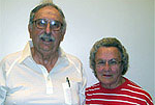

Oval Myers Jr. '58 jokes that he became involved in international
agricultural work because "the West was already won and I was too old to go
to the moon."
Maybe so, but the professor emeritus of plant genetics from Southern
Illinois University Carbondale has gone plenty of other places to improve
agricultural education: Afghanistan, Pakistan, Zambia, and Brazil.
"I love learning new cultures, working with the people, and giving them the
assistance they need to solve their problems," said Oval, who farms near
Carbondale when not traveling the world. "It appeals to my adventurous
side."
In Afghanistan, ravaged by more than 25 years of war, civil unrest, and
political instability, Oval and a colleague from the University of Illinois
at Urbana-Champaign are assisting reconstruction efforts in work funded by
the U.S. Agency for International Development (USAID). They train
university faculty, ministry of agriculture researchers, and aid workers in
the latest agricultural techniques and have introduced soybeans to the
largely rural country.
They're assisted by faculty and researchers from Northwest Frontier
Province Agricultural University in Peshawar, Pakistan, about a day's
travel away from Kabul through the Khyber Pass. There Myers was part of a
long-term aid project that modernized the curriculum, constructed new
buildings, and integrated research into the life of the university.
In Afghanistan, 85% of college professors have only bachelor's degrees
while dealing with a dramatically growing number of students. At one small
university in a two-year period, the agriculture student body exploded from
200 to 900 students, with only 15 instructors. "So you can see how training
the professors to master's level would benefit them," Oval said.
During his own college days at Wabash, where he majored in botany, Oval
continued to live on his parents' farm near Roachdale, Indiana, and
commuted to classes. While working the farm, he still found time to run
cross-country all four years (the team was undefeated his senior year) and
enjoy extracurricular discussions in the Scarlet Inn.
"Professors were always in there," he recalled. "It was always easy to
blend into the conversation and put in your two cents' worth."
After graduating, Oval earned a master's degree at Dartmouth and his Ph.D.
at Cornell. He taught various botanical subjects at the University of
Arkansas for five years and then moved fully into agriculture, specifically
research into soybean breeding and genetics, during 31 years at SIU. He and
his wife of 48 years have two sons, one Wabash '82 and one DePauw '86, and
five grandchildren.
To ensure that others will receive the benefits of a Wabash education, the
Myerses have established a gift annuity with the College. They receive
payments for life at a rate greater than fixed investments such as CDs.
They also received a charitable income-tax deduction the year the gift was
made and other tax benefits.
"I decided we could use the extra income, and it also locked in income that
could benefit Wabash after I'm gone," Oval said. "I could have not attended
the College without scholarship assistance. Wabash helped me; this is just
a way of paying back."